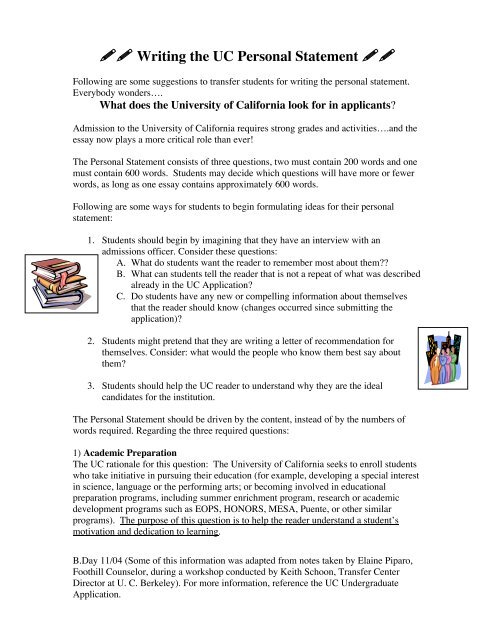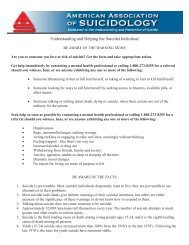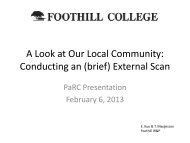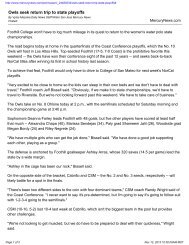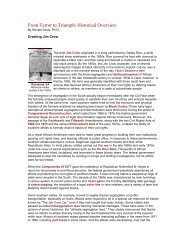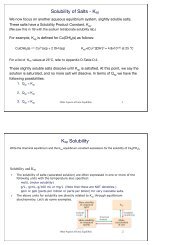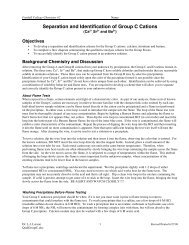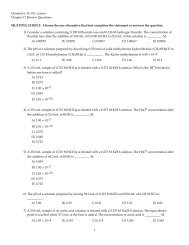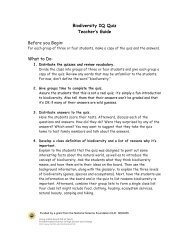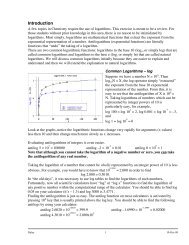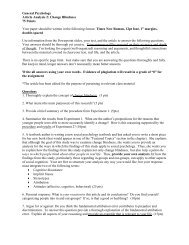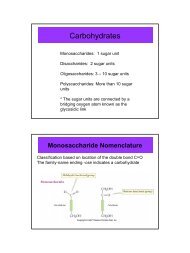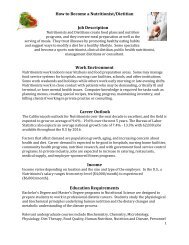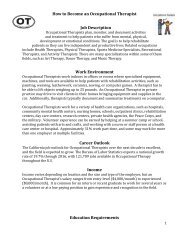Writing the UC Personal Statement - Foothill College
Writing the UC Personal Statement - Foothill College
Writing the UC Personal Statement - Foothill College
Create successful ePaper yourself
Turn your PDF publications into a flip-book with our unique Google optimized e-Paper software.
<strong>Writing</strong> <strong>the</strong> <strong>UC</strong> <strong>Personal</strong> <strong>Statement</strong> <br />
Following are some suggestions to transfer students for writing <strong>the</strong> personal statement.<br />
Everybody wonders….<br />
What does <strong>the</strong> University of California look for in applicants?<br />
Admission to <strong>the</strong> University of California requires strong grades and activities….and <strong>the</strong><br />
essay now plays a more critical role than ever!<br />
The <strong>Personal</strong> <strong>Statement</strong> consists of three questions, two must contain 200 words and one<br />
must contain 600 words. Students may decide which questions will have more or fewer<br />
words, as long as one essay contains approximately 600 words.<br />
Following are some ways for students to begin formulating ideas for <strong>the</strong>ir personal<br />
statement:<br />
1. Students should begin by imagining that <strong>the</strong>y have an interview with an<br />
admissions officer. Consider <strong>the</strong>se questions:<br />
A. What do students want <strong>the</strong> reader to remember most about <strong>the</strong>m??<br />
B. What can students tell <strong>the</strong> reader that is not a repeat of what was described<br />
already in <strong>the</strong> <strong>UC</strong> Application?<br />
C. Do students have any new or compelling information about <strong>the</strong>mselves<br />
that <strong>the</strong> reader should know (changes occurred since submitting <strong>the</strong><br />
application)?<br />
2. Students might pretend that <strong>the</strong>y are writing a letter of recommendation for<br />
<strong>the</strong>mselves. Consider: what would <strong>the</strong> people who know <strong>the</strong>m best say about<br />
<strong>the</strong>m?<br />
3. Students should help <strong>the</strong> <strong>UC</strong> reader to understand why <strong>the</strong>y are <strong>the</strong> ideal<br />
candidates for <strong>the</strong> institution.<br />
The <strong>Personal</strong> <strong>Statement</strong> should be driven by <strong>the</strong> content, instead of by <strong>the</strong> numbers of<br />
words required. Regarding <strong>the</strong> three required questions:<br />
1) Academic Preparation<br />
The <strong>UC</strong> rationale for this question: The University of California seeks to enroll students<br />
who take initiative in pursuing <strong>the</strong>ir education (for example, developing a special interest<br />
in science, language or <strong>the</strong> performing arts; or becoming involved in educational<br />
preparation programs, including summer enrichment program, research or academic<br />
development programs such as EOPS, HONORS, MESA, Puente, or o<strong>the</strong>r similar<br />
programs). The purpose of this question is to help <strong>the</strong> reader understand a student’s<br />
motivation and dedication to learning.<br />
B.Day 11/04 (Some of this information was adapted from notes taken by Elaine Piparo,<br />
<strong>Foothill</strong> Counselor, during a workshop conducted by Keith Schoon, Transfer Center<br />
Director at U. C. Berkeley). For more information, reference <strong>the</strong> <strong>UC</strong> Undergraduate<br />
Application.
Transfer applicants should describe <strong>the</strong> following:<br />
What is <strong>the</strong> intended major? Students should discuss how <strong>the</strong>ir interest in <strong>the</strong><br />
field developed and describe any experience <strong>the</strong>y have had in <strong>the</strong> filed – such as<br />
volunteer work, internships and employment, participation in student<br />
organizations and activities. It is important for students to describe what <strong>the</strong>y<br />
gained from <strong>the</strong>ir involvement in such activities.<br />
Students should explain why <strong>the</strong>y chose this major. Their reasons should<br />
demonstrate <strong>the</strong>ir passion, motivation, and dedication to <strong>the</strong> chosen field.<br />
Students should share how <strong>the</strong>y became interested in <strong>the</strong> intended major. For<br />
example, <strong>the</strong>y might describe an inspirational class, or instructor, a meaningful<br />
internship, a personal hobby, influential book or writer, or related work<br />
experience,<br />
Students should also describe any personal or academic activities that demonstrate<br />
<strong>the</strong>ir interest in <strong>the</strong>ir major or <strong>the</strong>ir professional goals. Students should include a<br />
description of such activities (e.g. club memberships, lectures, travel experiences,<br />
work).<br />
Students should outline <strong>the</strong>ir motivation for participating in <strong>the</strong>se experiences. In<br />
addition, <strong>the</strong>y should explain what <strong>the</strong>y learned from <strong>the</strong> experience and describe<br />
<strong>the</strong> personal impact. Students should seek to help <strong>the</strong> reader understand <strong>the</strong>ir<br />
personal character.<br />
Students should show a connection between <strong>the</strong> major and <strong>the</strong>ir professional<br />
goals. For example, students might discuss <strong>the</strong>ir choice of an English major and<br />
<strong>the</strong>ir goal to teach writing at <strong>the</strong> secondary level; or, <strong>the</strong>y might describe <strong>the</strong>ir<br />
choice of a biology major and <strong>the</strong>ir decision to pursue a career in biomedical<br />
research.<br />
Students who are applying to different, but related majors at separate <strong>UC</strong><br />
campuses should identify a common thread amongst <strong>the</strong>m.<br />
2) Potential to Contribute<br />
The <strong>UC</strong> rationale for this question: The <strong>UC</strong> welcomes <strong>the</strong> contributions all students<br />
bring to <strong>the</strong> campus learning community. This question seeks to determine an applicant’s<br />
academic or creative interest and potential to contribute to <strong>the</strong> vitality of <strong>the</strong> University.<br />
Transfer applicants should describe <strong>the</strong> following:<br />
Students should describe a talent, experience, previous contribution or personal<br />
quality <strong>the</strong>y will bring to <strong>the</strong> University of California.<br />
B.Day 11/04 (Some of this information was adapted from notes taken by Elaine Piparo,<br />
<strong>Foothill</strong> Counselor, during a workshop conducted by Keith Schoon, Transfer Center<br />
Director at U. C. Berkeley). For more information, reference <strong>the</strong> <strong>UC</strong> Undergraduate<br />
Application.
Students are required to describe any special talents, skills, experiences, and<br />
personal qualities <strong>the</strong>y possess. This is an appropriate place for students to<br />
identify awards or honors <strong>the</strong>y have received.<br />
The reader should be able to see a trend in <strong>the</strong> students’ lives in this essay,<br />
demonstrating that <strong>the</strong> students are tenacious, hard-working, quick learners and<br />
self-motivated. More than merely listing personal qualities, students should<br />
describe <strong>the</strong> personal results of possessing <strong>the</strong>se qualities. Students might<br />
consider looking to close family members or friends for help in identifying <strong>the</strong>se<br />
qualities.<br />
Students should be introspective, examining who <strong>the</strong>y are as well as <strong>the</strong>ir<br />
capabilities and <strong>the</strong>ir capacity to contribute to <strong>the</strong> University.<br />
Students who are recent immigrants might consider describing <strong>the</strong>ir capacity for<br />
bringing a new culture, a different perspective, or diverse values to <strong>the</strong> University.<br />
Re-entry students (aged 25+) should describe <strong>the</strong> scope/breadth of maturity and<br />
experience <strong>the</strong>y will contribute to <strong>the</strong> University.<br />
The length of this question does not have as much weight as <strong>the</strong> value of <strong>the</strong><br />
content.<br />
3) Open-Ended Question<br />
The <strong>UC</strong> rationale for this question: This question seeks to give students <strong>the</strong> opportunity<br />
to share important aspects of <strong>the</strong>ir schooling or <strong>the</strong>ir lives – such as <strong>the</strong>ir personal<br />
circumstances, family experiences and opportunities that were not available at <strong>the</strong>ir<br />
school or college as well as any o<strong>the</strong>r factors that may not have been sufficiently<br />
addressed elsewhere in <strong>the</strong> application.<br />
Transfer applicants should address <strong>the</strong> following:<br />
Is <strong>the</strong>re anything else students would like <strong>the</strong> reader to know about <strong>the</strong>mselves or<br />
<strong>the</strong>ir academic record that were not described elsewhere in this application (e.g. a<br />
term with numerous withdrawals, a substandard grade, a disability, family factors<br />
that influenced <strong>the</strong>ir progress).<br />
This is an opportunity for students to discuss anything not covered in Questions 1<br />
or 2. Students may choose to include information regarding a “mixed record” (a<br />
combination of weak, excellent, repeated, or incomplete grades, etc). This is an<br />
opportunity for students to explain initial struggles with multiple responsibilities<br />
(balancing work/job/family), acknowledge lack of responsibility in understanding<br />
college regulations (e.g. course withdrawal deadlines) or difficulties due to a<br />
previously undiagnosed learning disability.<br />
B.Day 11/04 (Some of this information was adapted from notes taken by Elaine Piparo,<br />
<strong>Foothill</strong> Counselor, during a workshop conducted by Keith Schoon, Transfer Center<br />
Director at U. C. Berkeley). For more information, reference <strong>the</strong> <strong>UC</strong> Undergraduate<br />
Application.
It would be appropriate for students to describe special programs in which <strong>the</strong>y<br />
participate that have helped <strong>the</strong>m to achieve academically. Students should<br />
explain why <strong>the</strong>y are in <strong>the</strong> program, what <strong>the</strong>y learned from this involvement,<br />
and how <strong>the</strong>y have benefited academically from it.<br />
Students should describe significant challenges <strong>the</strong>y have experienced. If<br />
appropriate, students who are also recent immigrants might choose to describe<br />
new cultural behaviors, and educational challenges, o<strong>the</strong>rs might describe issues<br />
related to being <strong>the</strong> first in <strong>the</strong> family to attend college, some students might<br />
discuss extreme financial challenges, and o<strong>the</strong>rs might explain <strong>the</strong>ir experiences<br />
working while going to school. Note: students who worked full-time should<br />
describe how <strong>the</strong>ir situation will change in order for <strong>the</strong>m to attend class full-time<br />
after transfer.<br />
Students should describe each special circumstance in detail and share its impact<br />
on <strong>the</strong>ir academic progress or achievement. Students should explain how <strong>the</strong>y<br />
overcame this challenge. For example, one student with a learning disability<br />
described how utilizing resources at her school helped her to ultimately achieve<br />
her academic goals.<br />
O<strong>the</strong>r Tips for <strong>Writing</strong> <strong>the</strong> <strong>Personal</strong> <strong>Statement</strong><br />
Don’t be subtle.<br />
Be direct. Don’t expect <strong>the</strong> reader to read between <strong>the</strong> lines.<br />
Be au<strong>the</strong>ntic: try to help <strong>the</strong> reader to get to know <strong>the</strong> real you.<br />
Be honest. Students should never exaggerate <strong>the</strong>ir strengths or misrepresent <strong>the</strong>ir<br />
cultural heritage.<br />
Ask a trusted friend or instructor to read your essay and provide honest feedback.<br />
Remember that <strong>the</strong> statement must reflect your own writing!<br />
Proofread your statement several times. You don’t get a second chance to make a<br />
first impression!<br />
Interesting Facts about <strong>UC</strong> Berkeley<br />
30% of transfer students who apply are accepted; moreover, 90% of those<br />
students come from California Community <strong>College</strong>s!<br />
Inter-campus <strong>UC</strong> and CSU-<strong>UC</strong> transfers are afforded lowest priority.<br />
B.Day 11/04 (Some of this information was adapted from notes taken by Elaine Piparo,<br />
<strong>Foothill</strong> Counselor, during a workshop conducted by Keith Schoon, Transfer Center<br />
Director at U. C. Berkeley). For more information, reference <strong>the</strong> <strong>UC</strong> Undergraduate<br />
Application.
International (F-1) students do not receive admission priority because <strong>the</strong>y have<br />
not contributed to <strong>the</strong> tax base, according to California’s Master Plan for<br />
Education.<br />
Students admitted to <strong>the</strong> Haas School of Business must begin classes during <strong>the</strong><br />
summer before <strong>the</strong> fall semester for which <strong>the</strong>y are accepted. There are no<br />
exceptions to this requirement.<br />
Inter-campus transfers (<strong>UC</strong>-<strong>UC</strong>) may not complete IGETC for <strong>the</strong>ir general<br />
education. These students may ei<strong>the</strong>r complete campus-specific G.E. Breadth<br />
Requirements or may have access to intercampus G.E. Reciprocity Agreements.<br />
To Which Public Universities do <strong>Foothill</strong> <strong>College</strong> Transfers Go?<br />
To see <strong>the</strong> latest figures for <strong>Foothill</strong> <strong>College</strong> transfers to <strong>the</strong> University of California,<br />
access:<br />
http://www.cpec.ca.gov/OnLineData/TransferPathwayChart.asp?43<br />
5227<br />
Good luck!<br />
B.Day 11/04 (Some of this information was adapted from notes taken by Elaine Piparo,<br />
<strong>Foothill</strong> Counselor, during a workshop conducted by Keith Schoon, Transfer Center<br />
Director at U. C. Berkeley). For more information, reference <strong>the</strong> <strong>UC</strong> Undergraduate<br />
Application.


